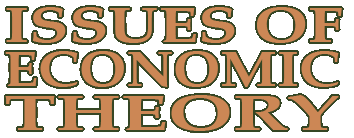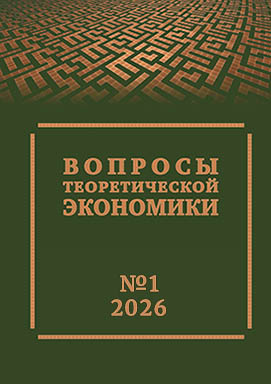| №4 (29) / 2025 |
  |
|
Release Date 10.11.2025
Volchik Vyacheslav
DSc in Economics, Professor, Head of the Department of Economic Theory of the Faculty of Economics
Southern Federal University, Rostov-on-Don, This email address is being protected from spambots. You need JavaScript enabled to view it.
https://orcid.org/0000-0002-0027-3442
Kot Vera
PhD (Economics), Associate Professor of the Department of Economic Theory of the Faculty of Economics
Southern Federal University, Rostov-on-Don, This email address is being protected from spambots. You need JavaScript enabled to view it.
https://orcid.org/0000-0002-6910-2086
REFORMS: THE FACTOR OF IDEOLOGY IN THE LIGHT OF RUSSIAN SCIENTIFIC PUBLICATIONS
The article examines the influence of ideology on the processes of social and economic transformation based on a qualitative analysis of the most cited articles by Russian economists in the scientific electronic library eLibrary.RU for the period 1992-2025. In this article, we are based on the theses put forward by the famous Russian economist V.M. Polterovich spoke about the negative impact of ideologies on the development of reform strategies in "catching up countries", and the thesis that following the dominant ideology leads away from the latest achievements of economic science: The analysis of scientific articles to confirm the theses was carried out in stages over the periods 1992-1997, 1998-2002, 2003-2007, 2008-2012, 2013-2017 and 2018-2025. The thesis about the systemic limitations of ideologically determined reforms leads to a one-sided understanding of economic processes and a violation of an integrated approach to regulation. Special attention is paid to the second thesis – the lag of ideology from modern scientific knowledge. Using the example of China, an alternative approach is shown, where pragmatic ideology played a key role in the successful implementation of market reforms without the use of shock therapy, while maintaining manageability. The Chinese experience shows that ideology can serve as a catalyst for transformation, ensuring political stability by combining market mechanisms and strategic planning. Thus, the article suggests rethinking the role of ideology in carrying out reforms as a flexible tool that, when used pragmatically, contributes to achieving sustainable economic and social results.
Keywords: ideology, economic reforms, economic science, economic policy, Chinese experience of reform
JEL: A14, B41, C88
UDC: 330.101, 330.88
DOI: 10.52342/2587-7666VTE_2025_4_20_35
© V. Volchik, V. Kot, 2025
© Institute of Economics of the Russian Academy of Sciences «Issues of Theoretical Economics», 2025
Source of funding: This work was supported by the grant of Russian Science Foundation No. 24-18-00665, https://rscf.ru/en/project/24-18-00665/ “Ideological landscape of Russian economic science” at Southern Federal University.
ЛИТЕРАТУРА
- Ablazhey A.M. (2019). Transformations of the Institute of Science in modern conditions: analysis of research approaches. DOI: 10.17212/2075-0862-2019-11.2.1-44-62
- Alexandrova O.A. (2022). Welfare State: where did it go yesterday, and what to do tomorrow. DOI: 10.19181/population.2022.25.2.1
- Baranov V. (2016). The crisis of the Spanish «autonomous state» and the radicalization of the separatist movement in Catalonia: mutual influence.
- Binefeld , Chetvernina T., Lakunina L. (2007). Russian reforms and the position of women in the labor market and in society.
- Borokh N. (2023). Priorities of China's economic development in the modern official ideology. DOI: 10.31063/AlterEconomics/2023.20-1.10
complete reference list
close list
- Buchwald E.M. (2016). Strategy for the development of small and medium-sized enterprises in Russia until 2030: ambitions and realities. DOI: 10.15838/esc/2016.1.43.4
- Volchik V., Koryttsev M.A., Maslyukova E.V. (2018). Institutional traps and new managerialism in education and science. DOI: 10.29141/2218-5003-2018-9-6-2
- Volchik V.V., Maslyukova E.V., Marian P.A., Skryabin M.V. (2024). An empirical study of the ideological component in Russian economic science // Journal of Institutional Studies. Vol. 16 No.4. Pp. 42–59. DOI: 10.17835/2076-6297.2024.16.4.042-059
- Goland Yu. (2010). Comparison of the reforms of the NEP period and post-Soviet Russia. DOI: 10.32609/0042-8736-2010-4-82-99
- Grinberg R.S. (2016). The state and prospects of the economy of modern Russia. Understanding the role of the state in the economy.
- Grinberg R.S., Gorshkov M.K. (2012). The twentieth anniversary of Russian reforms in the assessments of economists and sociologists (twenty theses on the main thing).
- Domrin N. (2003). Civil society in Russia: historical inevitability or a new round of social experiments.
- Zarnadze A.A. (2015). On the unity, integrity and institutionality of the management system.
- Ivanov O.B., Buchwald E.M. (2022). Current problems of municipal reform in the Russian Federation.
- Istomina A. (2014). A result-based approach in the budget sphere in the context of budget risks.
- Kapelyushnikov R. (2022). The Adventures of «Neoliberalism». DOI: 10.22394/0869-5377-2022-4-1-49.
- Kirdina-Chandler S.G. (2022). Economic theory, ideology, and economic interest // AlterEconomics. Vol. 19. No. 1. Pp. 71–92. DOI: 10.31063/AlterEconomics/2022.19-1.5
- Korovyakovsky D.G. (2021). Institutional development of legal education and legal science.
- Kranina I. (2021). China on its way to achieving carbon neutrality/ DOI: 10.31107/2075-1990-2021-5-51-61
- Lomanov A.V. (2020). Modern China: Internal and external challenges at a new stage of transformation. DOI: 10.31857/S0869587320020073
- Metelev E. (2014). Transformational transformations in Russia and criminal phenomena at the present stage of society development.
- Mozias M. (2007). The ideology of economic reforms in China: the main stages of evolution.
- Moiseev N.N. (1993). Is Russia's twilight dawn or sunset? (Russia is at a crossroads).
- Orekhovsky P. (2023). What is the fault of economists? URL: https://stimul.online/reviews/v-chem-vinovaty-ekonomisty/ (access date: 01.09.2025)
- Orekhovsky A., Razumov V.I. (2025). Chalkboard Economics Theory: Between Reality and Simulacrum // AlterEconomics. Vol. 22. No, 1. Pp. 40–53. DOI: 10.31063/AlterEconomics/2025.22-1.4
- Pavlov V. (2006). National characteristics of economic behavior.
- Petukhov V. (2008). The dynamics of ideological and ideological attitudes of Russians.
- Polterovich M. (2017). Developing strategies for socio-economic development: science versus ideology.
- Polyakova M. (2006). Implementation of the principles of the rule of law in modern Russia.
- Popov V. (2025). The Chinese model. Why China lagged behind the West, and now it is overtaking it.
- Skripacheva I.A. (2007). The cultural environment of young cities.
- Tambovtsev V.L. (2024). Economic ideology: Versions of the concept’s acceptations and application. DOI: 10.32609/0042-8736-2024-10-5-27
- Tsyrendorzhieva D.Sh., Balchindorzhieva O.B. (2013). The Sinification of Marxism and the Modernization of China.
- Sheludko V.G. (2018). On the effectiveness of corporate governance in the Roscosmos State Corporation.
- Schumpeter J. (2012). Science and ideology.
- Chang H.-J., Lari T. (2024). Economics, Pluralism and Democracy: An Interview with Ha-Joon Chang // Erasmus Journal for Philosophy and Economics. Vol. 17. No.2. Pp. 201–238. DOI: 10.23941/ejpe.v17i2.92.
- Horn A. (2017). Government Ideology, Economic Pressure, and Risk Privatization. — Amsterdam: Amsterdam University
- Javdani M., Chang H.J. (2023). Who said or what said? Estimating ideological bias in views among economists // Cambridge Journal of Economics. Vol. 47. No. 2. Pp. 309–339. DOI: 10.1093/CJE/BEAC071.
- Drakopoulos A. (2025). Tony Lawson’s Critique of Modern Economics and his Contribution to Heterodox Economics // MPRA. Paper No. 123406. MPRA. URL: https://mpra.ub.uni-muenchen.de/123406/1/MPRA_paper_123406.pdf (access date: 01.09.2025).
- Klein D.B. (2013). The ideological migration of the economics laureates: Introduction and overview // Journal Watch. Vol. 10. No. 3. Pp. 218–239.
- Kozlowski A.C., Gunten van T.S. (2023). Are economists overconfident? Ideology and uncertainty in expert opinion // British Journal of Sociology. Vol. 74. No. 3. Pp. 476–500. DOI: 10.1111/1468-4446.13001;
- Mearman A., Berger, S., Guizzo D. (2023). What is Heterodox Economics? Insights from Interviews with Leading Thinkers // Journal of Economic Issues. Vol. 57. No. 4. Pp. 1119–1141. DOI: 10.1080/00213624.2023.2273130.
- Piketty T. (2020). Capital and ideology. — Harvard: Harvard University
- Weber I.M. (2021). How China escaped shock therapy: The market reform debate. — NY: Routledge.
- Wu Z. (2025). The Theory of Chinese Modernization. Singapore. — Berlin: Springer Nature.DOI: 10.1007/978- 981-97-8066-2.
Manuscript submission date 07.09.2025
Manuscript acceptance date: 27.09.2025
For citation:
Volchik V., Kot V. Reforms: the Factor of Ideology in the Light of Russian Scientific Publications // Voprosy teoreticheskoy ekonomiki. 2025. No. 4. Pp. 20–35. DOI: 10.52342/2587-7666VTE_2025_4_20_35.



